It was 1996 and a 19-year-old Cillian Murphy had just left college and was about to make his professional acting debut in Enda Walsh's play Disco Pigs.
He had been studying law at University College Cork but failed his first-year exams because, as he later recalled, "I had no ambitions to do it".
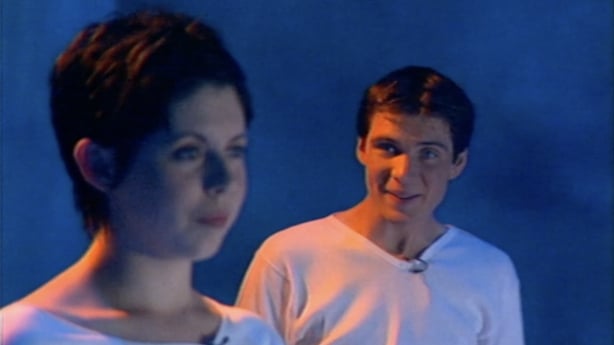
Instead, the stage came calling. In Walsh's celebrated work, the young Murphy played Darren/Pig opposite Elaine Cassidy as Sinéad/Runt. They are two young Cork people who have an intense and unhealthy relationship that begins to unravel as they hurtle toward adulthood.
Murphy had flirted with acting before. While attending Presentation Brothers College, he was part of a drama module presented by Corcadorca Theatre Company. However, despite encouragement from his English teacher, the novelist William Wall, he had set his heart on becoming a rock star.
Disco Pigs changed all that. After years of searching around for a creative outlet, it was a breakthrough moment for Murphy and after the play completed a successful tour, he committed to the idea of being a professional actor.
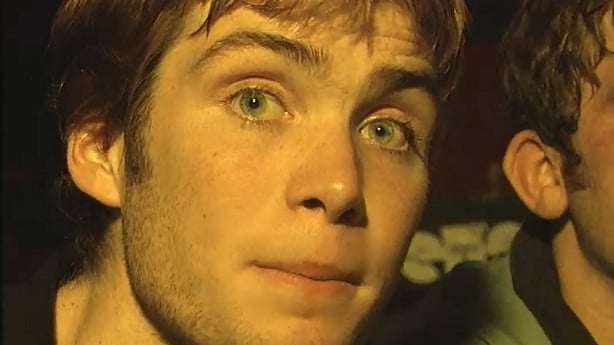
"When I packed in college, it was a great relief," Murphy told RTÉ Entertainment's Harry Guerin in 2001. "I always felt if I give acting a go, I haven't lost anything because I didn't start off at six or seven years of age going, 'I really want to be an actor, I really want to achieve this'.
"I was lucky because I said, 'if I don't achieve anything, nothing ventured nothing gained'. So, I gave it a go. I was very, very lucky."
In terms of his work attitude at least, not a lot has changed for the 47-year-old from Douglas in Cork since those early days. He has quietly clocked up a series of magnetic screen performances that seem to summon up vast reservoirs of vulnerability, subtlety and seriousness.
He was to reprise his role in the film version of Disco Pigs in 2001 but by then he was already a rising star.
His screen breakthrough came in 28 Days Later in 2002 and he went on to play a desperate IRA man in Ken Loach’s harrowing The Wind That Shakes the Barley; he had an eerie intensity as Scarecrow in the Dark Knight Trilogy; a brooding presence as physicist Capa in Danny Boyle’s claustrophobic sci-fi drama Sunshine; and he was unhinged as a coked-up City banker in Sally Potter's deliciously dark chamber piece The Party.
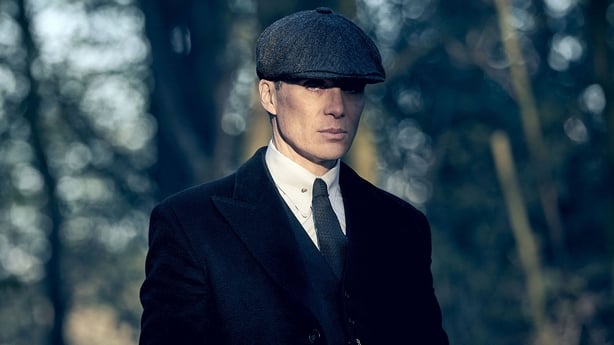
There has also been his role as the elegantly thuggish Thomas Shelby in Peaky Blinders. And who didn’t feel for poor old Rachel McAdams in the hugely entertaining airborne thriller Red Eye with Murphy as a plane passenger from hell?
However, he now stands on the verge of perhaps the crowning achievement of his career - an Oscar. He is in the running for Best Actor for his defining role in Oppenheimer, in which he plays the anguished lead role of the father of the atomic bomb, J. Robert Oppenheimer.
Directed by his longtime collaborator, Christopher Nolan, it has been praised as Murphy’s best role yet. Writing for RTÉ Entertainment, Harry Guerin said, "the Cork actor already has one accolade in the bag from five minutes in, namely that you can't imagine anyone else playing the theoretical physicist in this movie."
He’s already won a Golden Globe and BAFTA for the role so things are looking good for the actor on Sunday 10 March at the Dolby Theatre in LA.
It has been a steady climb to this moment. Murphy's rise has been down to hard work and choosing the right roles - a mix of blockbusters (and, in terms of Oppenheimer, an arthouse blockbuster) and Irish indies.
Born in May 1976 in Douglas to a French teacher mother and a father who worked for the Department of Education, he was raised alongside his younger brother, Páidi, and two younger sisters, Sile and Orla.
He did well academically at Presentation Brothers College but did not quite chime with the school’s passion for sports.
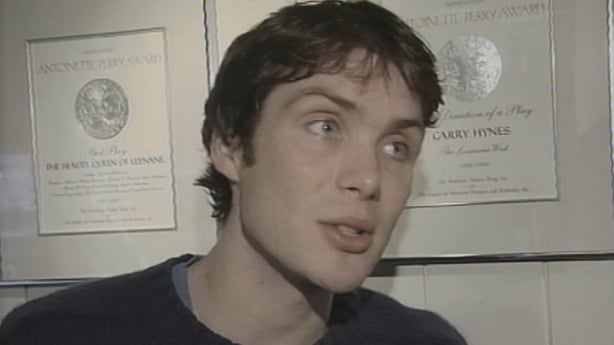
Speaking to UK newspaper The Independent in 2007, Murphy recalled, "I was good academically, but I wasn't very interested in sport and that ruled out a whole part of my education. I was keen on music and the arts."
His first creative outlet was music. Writing songs since he was ten, he formed a band called The Sons of Mr Greengenes - a line from a Frank Zappa song. With Murphy on guitar, they played at school concerts. "It was jazz-rock, with lots of long solos. We were good players but it was never commercial. It didn't transfer to records." he said.
He certainly didn’t take a conventional route into acting and that’s something that has worked in his favour.
As he told RTÉ Entertainment back in 2001, "Because I didn't go to drama school there were lots of things that I had to learn later about using voice on stage and techniques. It's a means to an end whether you happen to go and study drama for two years or whether you happen to get a break."
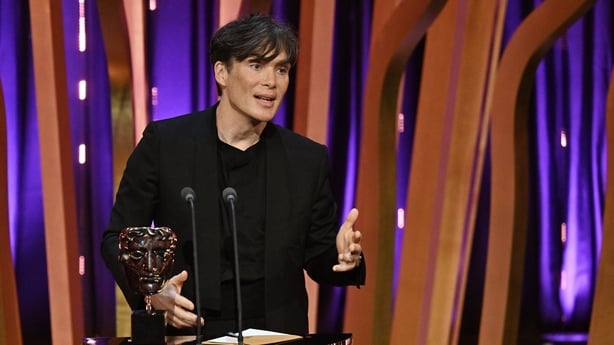
He is that rare thing - a movie star and a serious actor. In fact, an image of studied seriousness seems to follow him around and other than his appearance as "sad-sack Dublin shelf-stacker" in John Crowley’s noisome Intermission, he has yet to tackle a comedy role.
He shuns the limelight and looks slightly uncomfortable on the red carpet, "a challenge" that he does not "want to overcome" but knows it’s all part of getting eyeballs on whatever project he is selling.
Hardly a regular on Norton or Kielty’s couch, he can be guarded in interviews but also passionate about the role he is discussing. Instead of the chat show circuit, Murphy recently turned up on US news show 60 Minutes.
He is no luvvie. Vanity Fair are calling the new generation of Irish actors like Barry Keoghan, Paul Mescal and Andrew Scott "the Irish wave" but Murphy seems distanced from the whole thing even though he is one of its leading lights.
He is notoriously guarded about his private life. He married his long-time girlfriend Yvonne McGuinness in 2004 and they live in Monkstown, Dublin with their two sons, Aran and Malachy, who are 18 and 16, and Labrador Scout.
"There's 100 bad scripts for every one that's any good," he has said. "I'm OK with that, with sitting round the house for three or four months. I have a young son, I spend time playing with him, I read a lot, I run, I go to gigs.
"The only extravagant thing about my lifestyle is my stereo system, buying music and going to gigs."
He has always remained pragmatic and philosophical about his career and is fond of quoting a line from the late American director Sydney Pollack: "It takes 30 years to make an actor."
Rock stardom never happened but his passion for music will always be there. Murphy still plays guitar and writes songs, he has guest presented on BBC Radio 6 Music and was even featured on a single by Liverpool band The Coral.
As well as having to contend with the minor indignity of American and British journalists mispronouncing his first name, Murphy is very vocal about being a proud Irishman, something that is reflected in his choice of roles, particularly Loach’s wrenching The Wind That Shakes the Barley.
In one much viewed interview clip, the actor, who is a fluent Irish speaker, can be seen politely correcting an interviewer who refers to him as British. After all, he is from the rebel county.
Everything will come full circle for Murphy later this year for his next project, Small Things Like These. Tim Mielants' film reunites him with Eileen Walsh, another one of his Disco Pigs co-stars.
An adaptation of Claire Keegan's bestseller of the same name, it sees Murphy starring opposite Zara Devlin, Emily Watson and Michelle Fairley in a story set in a small town in Ireland over Christmas, 1985, with Murphy as a humble coal merchant who uncovers dark secrets in a convent which was a Magdalene Laundry.
It couldn’t be more different than Oppenheimer.
Speaking to RTÉ News recently in Berlin, where Small Things Like These opened the Berlin Film Festival, Murphy spoke about his Oscar hopes. "It’s all very exciting, I’m thrilled by it all, a little overwhelmed, there’s a lot of travelling but it’s amazing for the film.
"We can’t believe the response that Oppenheimer had with the audience obviously and then our peers. We’re all in a little bit of shock."
As he said a full 23 years ago in that interview with RTÉ Entertainment, "I'd do film, TV, theatre . . . whatever if it's good - that's my whole thing. I don't have any real preference. If it's good work and there's good people involved, I'll give it a bash."
Long may Cillian Murphy continue to give it a bash.
Alan Corr


